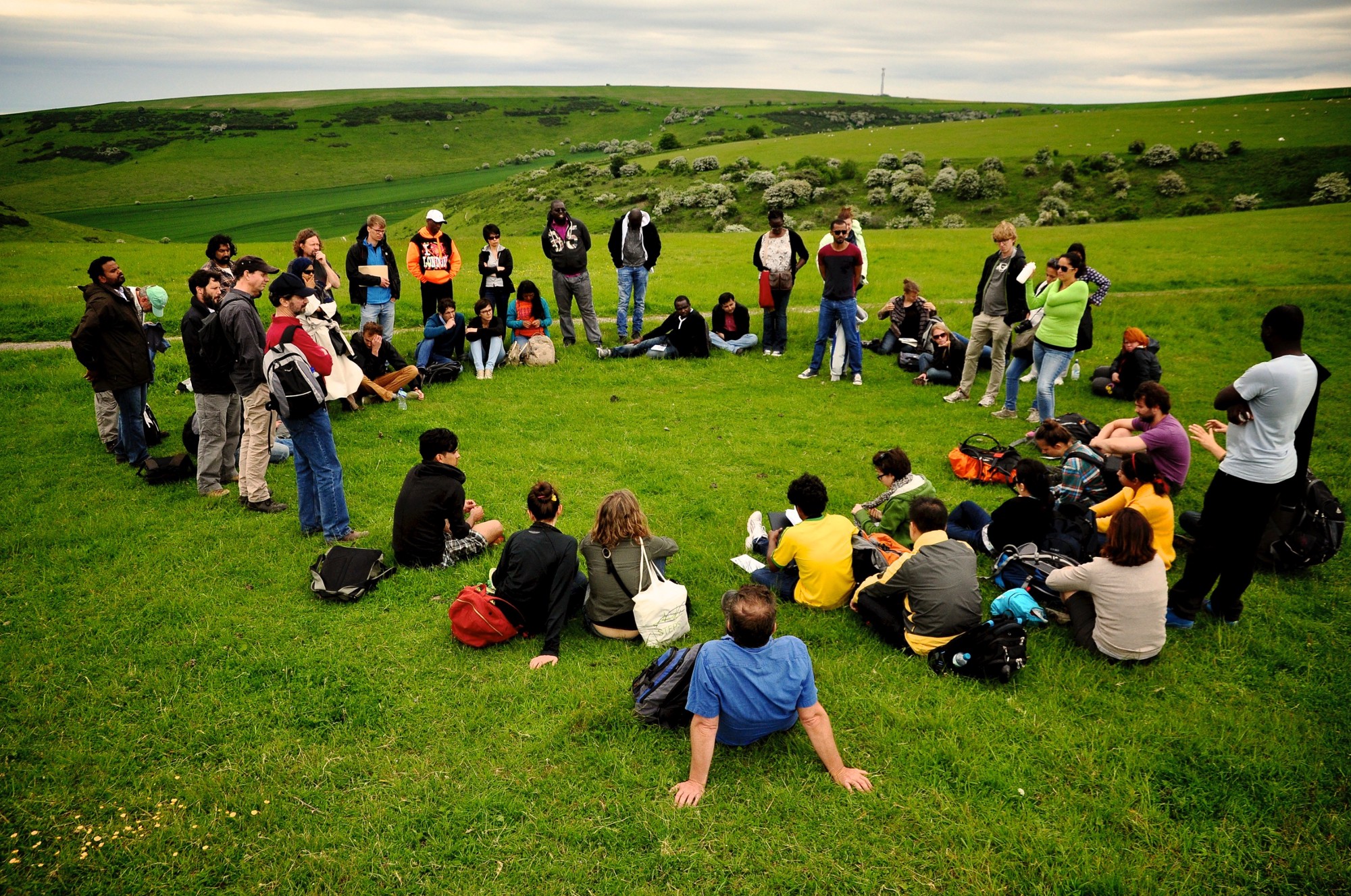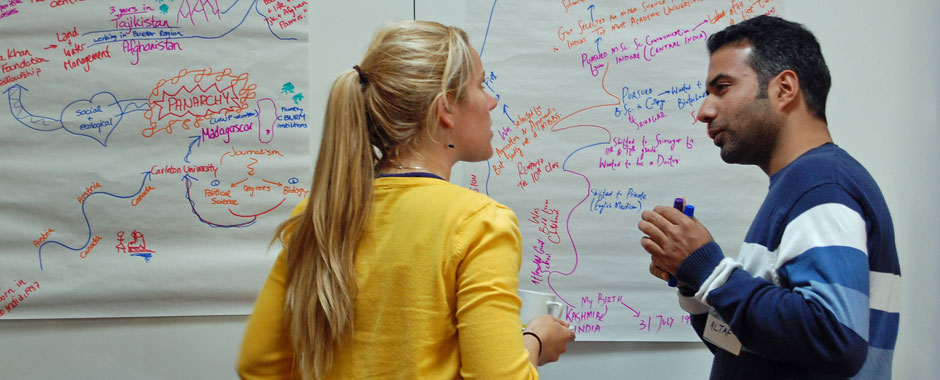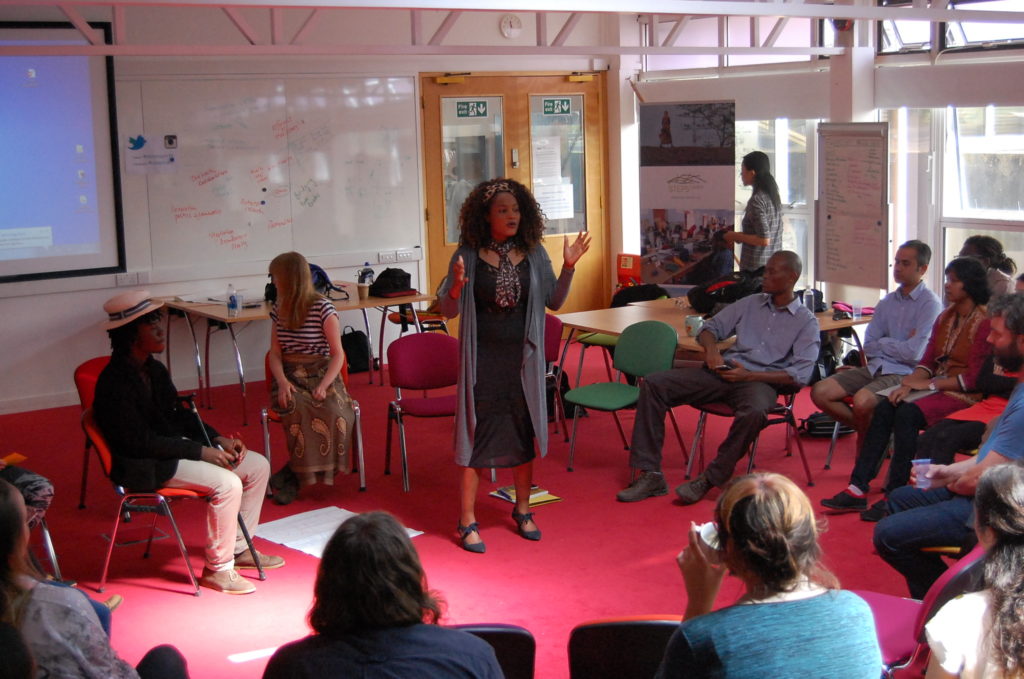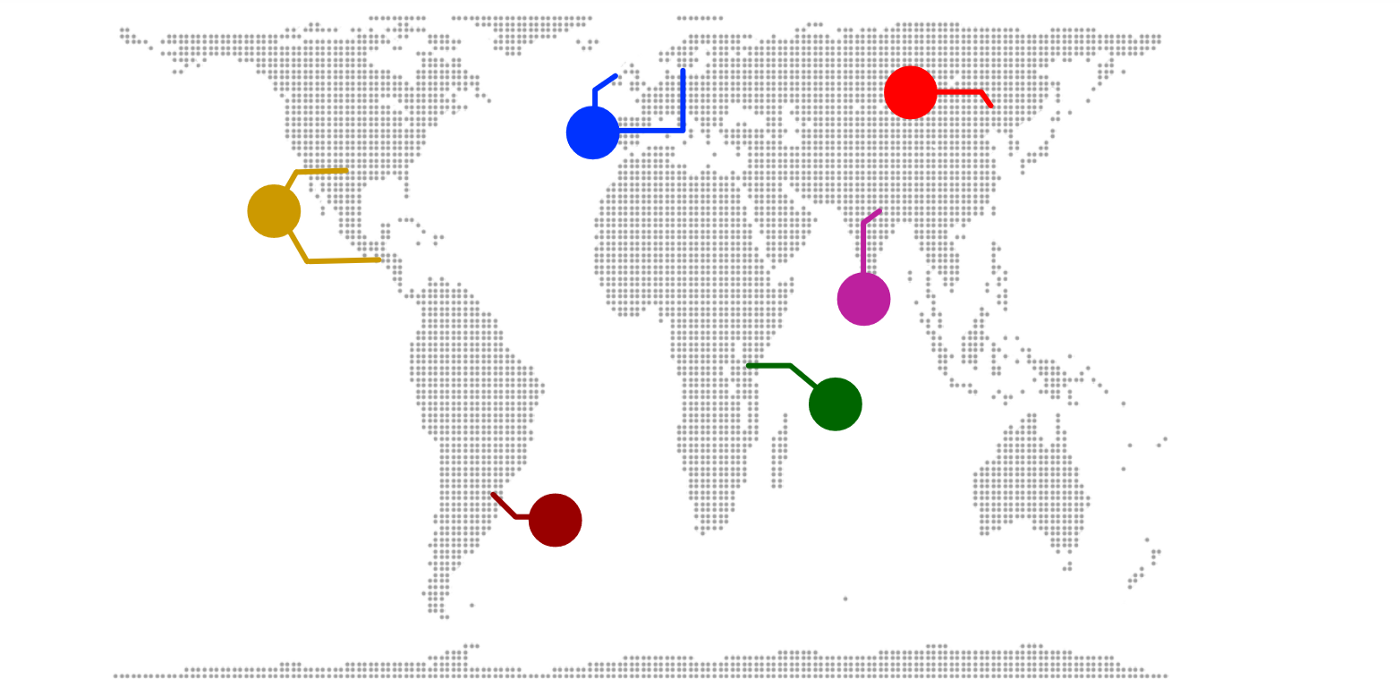This is one of a series of Stories of Change from the ESRC STEPS Centre.
From Summer Schools to establishing a global consortium – the story of how we shared insights and learned from networks of researchers and practitioners around the world.
One of the central aims of the ESRC STEPS Centre is to link research, action and training to foster new skills and alliances to link science, innovation and society.
The 2006 pamphlet, The Slow Race, identified several ways in which science and technology could work better for poor people through the engagement of citizens. What was needed was a new type of professional — one who could reach out beyond the lab, cut across disciplinary boundaries and understand diverse perspectives on complex problems.
“…What is needed, perhaps even beyond new investments in science capacity, is investment in a new generation of professionals who are committed to and rewarded for cutting across the boundaries between the natural and social sciences, who can act as innovation brokers, and who can facilitate the processes by which diverse perspectives from poorer people are brought to bear on science and technology. No matter how much good science is generated, without new professionals, technologies will not meet the needs of the poor.”
Melissa Leach and Ian Scoones, The Slow Race (Demos paper), 2006
This became a core part of the STEPS Centre’s mission. Alongside the research, we have hosted a series of Visiting Fellows and developed MA and PhD programmes to train researchers to cross disciplinary boundaries — for example, going beyond veterinary science to study anthropology and the social dynamics of disease.
As the STEPS Centre’s research agenda and reach expanded, so did the need to exchange and explore these ideas with a larger group of people. Annual conferences were one way to do this around particular issues. Another was an extensive and busy programme of events and seminars, connecting the centre with a wide community of thinkers and practitioners.

challenging pathways through the summer school


In 2012, we began an international Summer School hosted at the Institute of Development Studies. This offered a way to explore questions across the whole range of the STEPS Centre’s ideas and methods. The aim was to provide useful ideas, methods and cases from the Centre’s work to a group of participants, either working on doctorates or having just finished — all at the point where they were transitioning from education to practice.
To do this, we recruited widely from around the world. Participants had worked in diverse fields from journalism, natural science, anthropology, activism and the NGO sector — but all with a commitment to sustainability and to going beyond traditional approaches.
Since 2012, the Summer School has attracted more than 300 participants from over 40 countries. Each year, more than 250 applications came in for around 40 places.
[embedyt] https://www.youtube.com/embed?listType=playlist&list=PLI8qkz1i11OSTGR8U9UnEBw9S4NXKfod7&v=HgssEbCjL5M[/embedyt]
Developing an interactive programme was crucial, not only to share ideas from the Centre, but also challenge them.
Much of the learning and sharing derived from interactions between participants. At the beginning of each Summer School, we facilitated a participatory ‘rivers of life’ exercise, where all participants and faculty share where they have travelled since birth to the present. The array of experiences — personal and professional, academic and activist, was always extraordinary. It is this that the Summer School drew from, and each year was different.


At the core of the programme was a series of lectures. These ranged from talks on the STEPS pathways approach, to innovation and transitions, global governance and the Sustainable Development Goals, political questions around the Anthropocene, resource politics, methods and methodologies, uncertainty and foresight, policy processes and the political economy of transformations to sustainability.
Apart from lectures, the programme also incorporated spaces for discussion and personal and collective responses from participants — encouraging them to share their own experiences and ideas with each other. These included group discussion and feedback, as well as more ‘formal’ methods, including World Cafés and open spaces — for example for sharing of methods for sustainability.
Highlights of the Summer School programme were the two half-day ‘walkshops’, where we typically focused on particular themes (including uncertainty and policy processes), and discussed these following a lecture as we walked through the South Downs near the university. Participants were free to join up with each other to discuss questions as they walked, and react to the landscape as well as the topic. By going out of the ‘classroom’, the walkshops were intended to break down some of the hierarchies that can prevent open discussion, and allow participants time to range more freely and creatively around the topics.
A highly participatory and always fun ‘un-conference’ at the end of the Summer School was designed from scratch by groups of participants during the two weeks. For this, they were invited to go beyond traditional academic presentations to use creative formats and methods.
These have ranged from very intense sessions reflecting on personal feelings and memories of individuals’ careers; to group exercises on quantitative and qualitative methods; to lively games, music or role-plays exploring topics that arise during the Summer School. The very open format encouraged groups to think creatively and laterally about how to explore ideas, aiming to create a memorable experience that would stay with participants beyond the end of the two weeks.


The programme also included the STEPS Annual Lecture, free and open to the general public, with speakers including Achim Steiner, Harriet Bulkeley, Mike Hulme, Mariana Mazzucato, Michael Jacobs, Kate Raworth and Tim Jackson (you can view videos and slides from lectures on the STEPS website).
In 2012 and 2013, we also held public debates linked to the Brighton Fringe Festival — one on action around Rio+20 and global development goals, and another on climate change, fuel poverty and social justice. These brought a wider public audience into contact with the Summer School and provide an opportunity for local audiences to hear from important thinkers and practitioners on pressing sustainability challenges.
A central theme in discussions each year is the link between scholarship and activism: how can critical, engaged research make a difference? In 2016, supported by a grant from the Charles Léopold Mayer Foundation, we ran a distinct group activity on research-activism.





wider sharing
The financial and time commitments of attending the Summer School are still a barrier for some. To share ideas with a wider audience, we have made much of the material from the Summer School available for free online.
The STEPS e-learning platform, launched in 2017 and updated in 2021, includes a ‘Pathways to Sustainability’ online course. The lectures are accompanied by reading lists, including open access readings where possible, and questions to guide reflection and onward study. The site is open access, and students can learn at their own pace, or instructors can use the materials to inform their own teaching.
We have also worked to create a network of STEPS Alumni drawn from past MA/PhD students, STEPS researchers and participants in the Summer School. This network, with around 400 members, is kept in touch with an annual newsletter and groups on Facebook and LinkedIn, and members regularly report meet-ups and chance encounters in far-flung places.
The Alumni network has been an invaluable way for us to stay in touch with a growing group of people working with STEPS-linked ideas, who are now taking the pathways approach forward in new directions. Examples are a paper on socio-technical transitions in energy, which built on the STEPS approach, a blog series on the Anthropocene featuring contributions from three alumni, writing on narratives about invasive species, and a paper looking at synergies between the Stockholm Resilience Centre’s ideas and the pathways approach. A STEPS Working Paper on energy transitions in Germany was also produced by alumni.






global consortium: steps around the world
The STEPS Centre’s Pathways to Sustainability Global Consortium was launched in 2015. It links the STEPS Centre in the UK with long-established partners around the world who connect research, policy and action on sustainability in Africa, Europe, Latin America, North America, China and South Asia. Many STEPS Alumni are now working in these hubs or connected to them in their work. We launched a website showcasing the work of the Global Consortium, with material sourced from all the hubs as they continue their work.


Participants from the six Consortium ‘hubs’ attended the Summer School, and continued to engage with STEPS afterwards through their work. We also linked our Summer School to the Pathways Network, a project run by the Global Consortium hubs, exploring how transformative spaces are created in six sites around the world. This encouraged personal as well as professional links, crucial for working together in addressing the interlinked, global challenges of sustainability.






Since we started on the STEPS Centre’s journey in 2006, the challenge of building new kinds of professional capacities and alliances that cut across academic disciplines and even go beyond academia itself, has become even more pressing.
As the world confronts the challenges of the Sustainable Development Goals, the demand for new sustainability professionals is huge. The STEPS Summer School, linked to the STEPS Global Consortium, has been one small contribution to this effort, with long-lasting impacts that we hope will continue long after the formal closure of the Centre in 2021.
find out more






Stories of Change
From 2006-2021, the ESRC STEPS Centre explored pathways to sustainability – showing the important roles that marginalised ideas, knowledge and forms of action could play in responding to complex social, technological and environmental challenges.
In this process, we were involved in many process of change, from local struggles to high-level international debates. These Stories of Change explore some key themes from STEPS work, to share what we learned.
